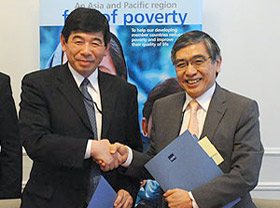
World Customs Organization, ADB boost partnership for trade facilitation
The MOU, signed at ADB’s 43rd Annual Meeting in Tashkent, Uzbekistan, aims to build a more active partnership to make it easier to conduct international trade, which in turn will support long-term, sustainable and inclusive development.
The MOU will see the two institutions cooperating more closely in areas relating to customs modernization and reform, capacity building, and research and analysis. The MOU will also boost information and knowledge sharing, staff cooperation, and production of joint publications and other knowledge products.
"Facilitating and securing global trade will have a substantial economic impact on ADB’s developing member countries and will further deepen regional economic integration in the region," said Mr. Kuroda. "Under the MOU, ADB’s infrastructure finance and regional cooperation programs and WCO’s technical customs competency will complement each other and improve the efficiency of our efforts to facilitate trade."
Many companies in Asia face difficulty in conducting cross-border trade because of inefficient customs practices, which keep the costs of doing business high. Improving customs practices and establishing international trade supply chains will boost trade in intermediate and final goods, helping companies to grow their businesses and creating more jobs.
"The MOU between ADB and WCO is another important step in the long history of cooperation between our two organizations and will further solidify our relationship while forming the backbone for future collaboration on important global and regional issues," said Mr. Mikuriya. "Our joint efforts to enhance trade facilitation and ensure a secure trade supply chain will bolster economic recovery and stability, as well as increase revenue security."
ADB and WCO have been collaborating since the early 2000s on transport and trade facilitation in Asia, notably through regional cooperation initiatives such as the Central Asia Regional Economic Cooperation (CAREC) and Greater Mekong Subregion (GMS) programs.
WCO is the only international intergovernmental organization with a unique focus on customs matters. Based in Brussels, it has 176 member customs administrations that collectively process approximately 98% of world trade. With its worldwide membership, WCO is recognized as the voice of the international customs community.
Committed to facilitating trade, WCO’s revised Kyoto Convention on the simplification and harmonization of customs procedures is recognized as a primary source of reference by WTO trade facilitation negotiators, and its technical competency enables it to build and support sustainable capacity in customs.